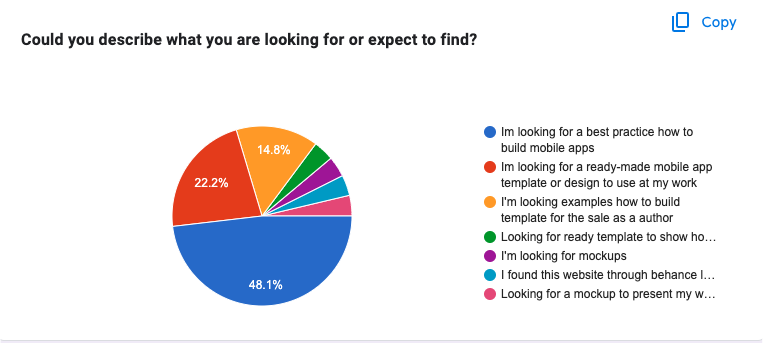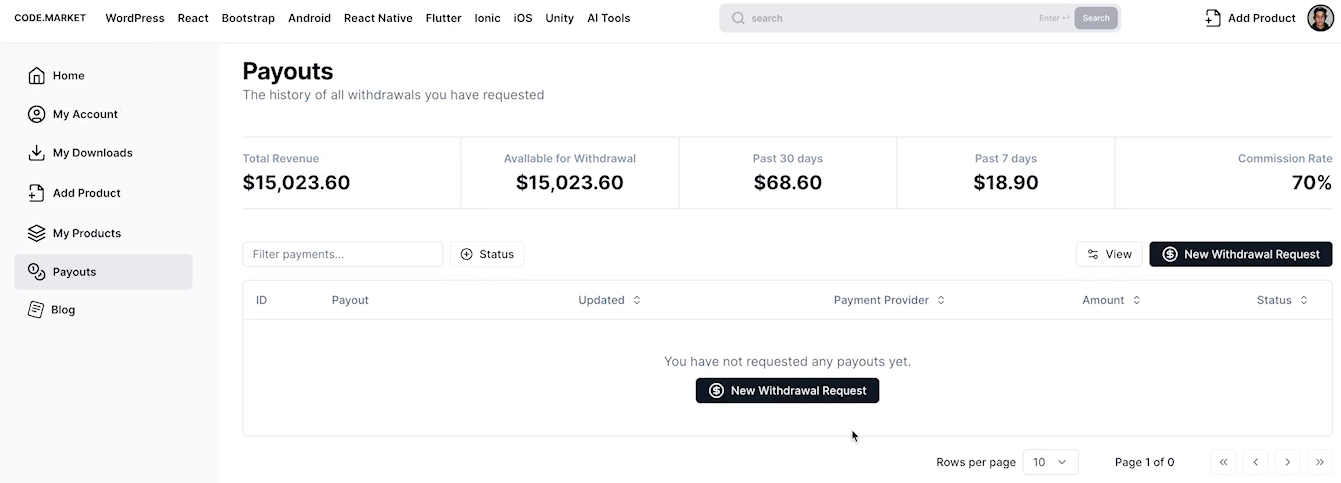How I Spent 4 Years and $50,000 Building a Competitor to ThemeForest

Hey there, fellow indie hackers! I'm here to share a tale that's pretty close to my heart. It's about a journey—a long, sometimes brutal, but ultimately rewarding trek through the wilds of the digital product landscape. This story is for you, the product creators, the dreamers, and the doers, who fill places like this with your ambition and innovations.
From idea to first steps
I've got quite the experience with digital products. Back in 2017, I created an Instagram mockup that got downloaded over 100,000 times.
Then, in 2018, I got the idea: create a product for ThemeForest. I spent 7 months trying to get my product up on ThemeForest. At that time, ThemeForest had this rep: make anything, and it'll sell, and you can live off that money. I opted to make a hotel booking template. All 7 months, I faced hard rejections and soft rejections. Anyone who's tried knows what I'm talking about.
7 months of hard rejections
But after 7 months, I finally got it listed there and then got 0 sales for the next half a year. Maybe my product wasn't great, or perhaps I just published it in the wrong niche. I started looking into this and realized I wasn't the only one trying to get their product out there, facing rejections over and over, and then, when they finally do get listed, there are no sales. People's products were piling up along with their frustration. At that moment, I realized here's the gold mine—to gather together with those like me, those who weren't let into the club, and make our own club.

Complete freedom for creators there is a gold mine
With that thought, I came up with a platform offering complete freedom: post whatever you want, sell whatever you want, no restrictions. Fast forward, I'll say that some moderation will still be needed, like post-moderation, for example. I don't know how they solve this problem on Gumroad, but when we gave people the opportunity to publish products without moderation, we faced copyright infringement and credit card fraud.
If anyone is interested in how such platforms get defrauded, ask in the comments, I'd be happy to talk about it.
The birth of code.market
I snagged the domain code.market, which cost me more than $1,000 and its renewal costs $1,200. From this domain, I started building the concept:
any coder can sell their product with us without any restrictions.
Right away, I came up with a slogan:
If code was written, it can be sold.
Along with this, I immediately identified several main killer features that seemed to turn the game around:
- Integration with GitHub, so you don't have to upload zip files every time you want to update, just connect GitHub and commit there to update the product.
- No complicated moderation.
At that time, it seemed to me that these killer features were enough to make the platform mega successful.
The platform's up and running, but it's empty
With this idea, I started developing the product. The first version of the marketplace I made on WordPress in a couple of months, and by January 2019, there was already a working marketplace, but it didn't have a single product.

This is a classic that anyone who creates a marketplace faces: the chicken and egg problem. To get traffic and sales, you need products, and to get products, you need traffic and sales.
I couldn't think of anything smarter than making products myself, but before I started, I needed to decide on a niche. I understood that entering the WordPress niche in 2019 made no sense, it was completely saturated. Something fresh and gaining popularity was needed. I'm pretty good with technology, and at that time, cross-platform mobile development was on the rise. I made 6 templates on React Native, all classics: calculator, hotel, to-do, messenger, store, and restaurant. But as you've already guessed, 0 traffic 0 sales.
Next was an attempt to become the project of the day on Product Hunt, but Product Hunt is not really suitable for such projects, because if there is no immediate offer that converts traffic into buyers, there will only be a spike in traffic and nothing more.
Okay, Google, let's dive into audience.
The next step was to study our audience. The audience was mobile developers, because no entrepreneur or creator without knowledge in mobile development will be able to launch, let alone publish in production, a React Native application. There you have to do a million steps, and without a developer, it's not possible. And I began to study how developers buy, how they make decisions.
There are several reasons for buying such products:
- To learn how to do the same – about 50%
- Really to create and launch some project – about 20%
- And a bunch of other reasons

After research, it turned out that before buying a product, our audience googles a lot, from 100 to 300 times. If they find a free product with us, of course, they download it immediately and without hesitation.
The simplest way to boost the platform is to collect free products on it and parasitize on this traffic, but!
There's a huge difference between the audience that searches and downloads for free, and those who buy even for 1 dollar. It's incredibly difficult to convert someone who just downloaded a free mobile app template into someone who will pay for its license.
The trick that scored us our first traffic.
My plan was to bootstrap the project without rise investments. There was nowhere to retreat; the problem of the lack of assortment had to be solved, and I realized that Themeforest could become our friends. I joined their affiliate program and started collecting products to us in the mobile development niche: flutter, ios, android, React native. With such a simple tactic, we collected 6,000 thousand products on the marketplace. And the platform came to life, it began to look solid. Google traffic pulled from SEO.
I understood that to stand in the user's path, we needed to pump SEO, especially low-frequency, here a powerful categorization of products helped us. Each product had 3-4 attributes that corresponded to some theme, for example, Flutter e-commerce technology and category. We began to create URLs in the catalog that would respond to the query "Flutter E-commerce app template." And this bore fruit: Google began to raise us, and we got the first traffic. Over time, we got an average position in Google - 20. This is both good and not very good.
Who understand SEO, tell me in the comments how realistic it is for such a platform to make an average position of 10 and above and if it is realistic, what needs to be done?

The first traffic comes.
Next problem appeared: it was very difficult to earn on this traffic because it left us for Envato through affiliate links, and what happens next with the user, is not clear. Envato has quite strict restrictions for publishers, 30% commission from each sale, you will only receive if you brought to Envato a new user who was never registered there. And since they have more than 18 million users, this is very difficult. I think many of you have bought something there at least once. We did not receive commissions for such users, although we sent 20-30 people a day and earned 0. This was incredibly frustrating.
I understood that we needed products that were directly listed with us, I started writing to authors so that they would list with us. But all the authors I wrote to said they didn't want to list because then they would lose their exclusive authorship on Envato. Along with these refusals, I was waiting for the first success. By the way, how would you act to attract authors to the platform?
First success
But along with the failure with the authors, I was waiting for the first success. I remembered my mockup, which was distributed for free. And I listed it for $9. Then I redirected all links from all my social networks, Behance, the site where it was posted, to code.market, and in the first month, I sold for $1,000. In the first year of sales, I earned my first $10,000 on it.
For me, this was a real success:
- I realized that the platform is not dead, it can sell if you list the right product and do marketing for it.
- I had free money to develop code.market.
All the money earned I invested back so that the platform could develop

Nothing happened for three years.
In 2020, COVID-19 was raging in full swing, and my development business went downhill. I had to go to work for hire. At the end of 2020, I went to a very well-known and large IT company, where I spent the next 3 years as a product-lead. There I launched several amazing products. One with a billion GMV, the second with profitability by EBITDA. I realized that I can create products that change the market and bring huge profits. It was an incredible experience in hiring. But all these 3 years I did not deal with code.market, it just lay there and lived its own life.
Back to the business
In January 2023, I decided to see what was going on there at all and saw that over 3 years, while I was not engaged in the project, we paid authors more than $40,000. My experience in hiring and this result inspired me very much. I realized that the project is needed and it can become big.
That experience and knowledge I gained working on such a project are invaluable, I learned about: Marketing, User experience, Markets, Strategy, Design, Enhanced my development knowledge
No hiring experience can provide so much cool knowledge and expertise in such a short time.
So, I decided to quit and focus on code.market, but slightly changing the concept: if before we had only mobile app templates on the platform, now we decided to start selling any digital products.
In essence, announcing the concept from creators to creators. We made a platform where any individual contributor can test their hypothesis by creating a product, no need to register a company, just have a product, list it, collect the first sales and audience.
Fivefold growth
In 2020 we had 6,000 products, and by 2023 it became more than 50,000. For the same 2023, we grew 5 times according to the schedule. We still redirect some of the traffic to Envato, but! Now it's not 30 people a day but 300-500.

In addition, we gave the opportunity to import their products from another platforms to us. So that creators could increase their revenue by selling with us too.
In addition to import, we have many great ideas for 2024.
- We have no restrictions on what products can be published, except for explicitly prohibited ones and copyright infringement (we monitor this)
- Creators asking for crypto withdraw and we made it. Any Creator will be able to withdraw their funds through USDT without restrictions.
- We plan to develop the social component of the platform so that we as creators can exchange experiences
- Give every creator access to their audience so they can interact with it.
- We give still best commission rate for creators at the market
I know what you're thinking, why do this if there's already Envato and Gumroad.
Because I love it.

I have ambition to create a global product for creators all over the world. It inspires me even more when there are such powerful and respected competitors by me. I'm very curious about what we can offer creators to win the battle for their attention. And now I'm not alone, I have a team that is passionate about this idea.
By the way, if you create digital products and are looking to sell them, feel free to reach out to me directly via DM at X.com and I'll give you special commission rate.


Nice read, is your product profitable?
Yes it is
That's inspiring!
Great story and glad you keep pushing on. It takes time to build large platforms and get publishers on board. Nice work!
The website is very buggy, I can't even browse...
I was going to consider listing my themes from Lexingtonthemes.com... But I doubt it.
Wow man amazing Products!. Let's go in DM discuss it.
sure, feel free to send me a dm on https://dm.new/michael
Sorry, can't write you in twitter "You can no longer send messages to this person"
Sent follow request.
that was weird...? probably because my DMs are actually closed.
Congrats on your project! I was previously selling on CodeCanyon, but left for the reasons mentioned here: https://forums.envato.com/t/state-of-the-market-from-an-authors-point-of-view/279522
I would have considered signing up as an author for CodeMarket, but this page seems AI-generated with not much actual information: https://code.market/page/start-selling-as-author
Dear @XCH, thank you very much for your detailed comment on the Envato forum. In fact, everything you described resonates with us, and that's exactly why we started to build our platform for users who are dissatisfied.
I want to respond to your post on the forum here in the comments on IH, because it may be important for many CC authors who find and read this article.
Your points is: (?)
My: {c}
–––
(?) Analytics: Currently my biggest issue is conversion tracking and optimization. I know I bring buyers to my CodeCanyon product page that have the intention to buy, but they don’t and I have no idea why. There is no easy way (that I know of) to even know if a user I brought myself to Envato buys my own item or not.
{c} That's true – analytics is a weak. Therefore, we at code.market are currently working on implementing advanced GA analytics for authors, with which it will be possible to track: products and authors profile page.
(?) Traffic: The amount of traffic and the number of sales generated by the traffic coming from the marketplace itself has decreased over time.
{c} This is a double-edged question. On one hand, the platform can and should share traffic, otherwise what's the point, but on the other, they are hostages to their own policy, where over the years thousands of identical products have emerged, competing for the same sale among themselves. This is also related to your next question; you could have driven traffic to your own products if there was a more reasonable commission and better analytics.
(?) Commission rates: Currently, from a sale of $59, I receive $43, which is approximately a 25% commission rate. Using a payment provider, the commissions are around 5%, so I would receive about $56. Linked to the traffic issue above: the difference of $16 could be used to market the product and get way more traffic than the one coming from the marketplace.
{c} It's important to note that you give away 25% because you have an exclusive author, but if you were starting from scratch, you would be giving away 37.5% + payment gateway fee.
– This system is not transparent, and if something not transparent it looks tricky.
– Our believes in code.market, newbies should earn as more as possible.
– We have implement a mechanism for everyone who wants to transfer products from Envato to code.market. This it possbile.
(?) Referrals: The new affiliate platform (impact) sometimes fails to register conversions. I know I bring customers that create new accounts and buy my products, yet I don’t always get a commission. Because of this, it’s hard to trust the platform and plan budgets for ad campaigns. The older system was also a lot easier to use ?ref=authorName.
{c} Their referral system sucks. But there's a solution: our referral system is in the works and will be just how you like it, with perpetual sales from referrals, one parameter in the link, etc. In short, everything they doesn't do, we do.
(?) Envato elements: This has been said many times before, showing a banner on our own product pages when we bring our users is not really author friendly. We don’t care about the numbers, whether it affects our sales or not, it's just that the majority of authors said they really don’t want something, yet our voice was ignored.
{c} We also drive traffic to their as a partner, and we had 0 sales in 2 months, even though we drive a lot of traffic. Their affiliate system just doesn't work.
(?) Missing important features: We have asked for some of those features for years, the lack of which vastly limits our marketing possibilities, features like:
– Coupon codes. – already appear in code.market roadmap.
– Discounted prices (show that an item is 30% off). – already appear in code.market roadmap.
– Better/easier to integrate analytics (as mentioned above). – already appear in code.market roadmap.
– Integrated item support system (why would we send customers to a different platform to get support for an item purchased on this platform?). – already appear in code.market roadmap.
(?) Better item upload/update experience (outdated item editor, when updating an item the changelog is only visible to the reviewer, not the customers, no API to update items, etc.). We were told that most of those features couldn’t be implemented because the platform's codebase is really old and every new feature is like mixing even more spaghetti code. How should we as authors and users of the platform feel about using an archaic system that has little to no chance of being updated any time soon? Why shouldn’t we switch to a platform whose future looks brighter than this?
{c} At code.market, we are focusing on the upload process. Everything you wrote will appear:
– One-click integrations with GitHub, Figma, etc.
– The ability to create variable products (e.g., a free version and a paid version within one product)
– You can already create free products to gather an audience; yes, we know about this marketing strategy because we study the lives of authors.
– The ability to communicate with your audience through the admin panel.
– Multi-authorship, where any percentage of the commission can be shared with any other author. For example, if a designer and developer worked together on a product, they could automatically split the commission between them.
– Of course, analytics on all your products and even on your profile page (it's still in development)
– And we are open to any new ideas and features for authors if we see that it improves their experience.
(?) Exclusive authors have 0 flexibility. As an exclusive author, I feel really limited because:
I sometimes want to offer my items for free. For example, I want to send my WordPress plugin to a blog publication for review, yet there is no way to do that within the current license without the blog owner actually creating an account on Envato and purchasing the item. This could be solved with the coupon feature or with a less strict exclusive policy.
I want to sell different versions of my items (one for basic users with minified code, one for developers with documented code and dev builds). The current licenses/terms don’t allow for that.
{c} Based on code.market roadmap for 2024, we are jump this gap for authors.
(?) Extra steps for buyers. If I bring a lot of users to my product’s landing page and they decide to buy, they go to the Pricing page of my site and then choose a version/license of the product. Once they click buy, they are driven away from my site to the Envato site where they have to click a few times, create a new Envato account where they have to fill like 7-8 fields, then fill in their billing details, etc. The idea is that this flow is very bad for the conversion rate, people who wanted to buy the item now have tens of reasons to drop the purchase. Why is that form so cluttered? Can just ask for the email and fill the rest later, after they make the purchase. Why even send the user to a different site? It could just be a modal popup for the user to enter email/payment info and then get the item without ever leaving the site. I know that the point of the marketplace is to sell the items within the marketplace, but we are also advised to market our products, but how can we market it if we cannot track properly the conversions and have to rely on a less-than-perfect check-out experience.
{c} We knew this and did exactly as you wrote. We have 1 step: you enter your email in a modal and go to purchase. Every additional step is -10% conversion, we know this and we care about what the purchase conversion rate will be.
The response turned out to be quite long, similar to an interview.
Starting small but thinking big was key here. Beginning with just a few templates, the founder proved the concept could work before expanding the platform's scope. This gradual approach helped work out kinks and build success over time.
Reinvesting profits back into further development is smart. Each new user and dollar earned could be plowed right back to improving the platform, creating a self-sustaining cycle of growth. Continued evolution keeps the marketplace competitive.
Thanks for sharing!
Alex, your journey is a masterclass in resilience! Turning the tables on the rejections and hurdles to build code market is seriously impressive. It's a perfect example for all of us here at the coalface of building and shipping products.
Really keen to see how the social features and crypto payouts will shake things up. Hats off to you for not just entering the arena, but for sticking it out and thriving. Onward and upward, Alex!
Thank you, this comment very very inspiring
Congratulations
Wow, this gave me chills! More power to you and one heck of a journey.
You're welcome, bro. Your chills my best achievement today.
Thank you for sharing your journey, ideas and memes :) It is indeed an expensive lesson.
Useful! Keep it up!
How long did it take to create a product? From idea to first version of the product?
The first version of the marketplace was created in 2 months. The process went something like this: idea -> design -> development -> production.
We salute ThemeForest's efforts and investments in creating a competitor that showcases entrepreneurship and innovation in the industry.
Awesome commitment to the goal. I am looking forward to following this progression with someone who has this much tenacity behind the wheel. Keep it up!
Very cool story! Do you have any authors generating enough consistent revenue to consider this a job?
Thank you. Do you mean consistent revenue like a 9 to 5 job for authors?
Very inspiring! Excellent job!
It's a bit confusing what we can learn from this tale.
Yeah, I know some questions remain unanswered in this article. During this journey, I learned many lessons, but that's another story. I'll try to tell it soon.
Awesome post. And congratulations on your success and kudos to your grit.
Few questions
It's impossible to convey in just one comment the difficulties we faced. There were thousands, but I treated them as part of the path.
Yes, I don't have a technical education, but we made hundreds of websites on WordPress before I started doing this, so I initially chose it as the platform because the shortest path is the one you know.
The story about SEO is very interesting. I don't know any SEO hacks that people write about on Twitter, like how to become top 1 in your niche in two weeks, but I do know that Google loves websites with a complex structure and a large number of pages for each query, and the higher the quality of the content on them, the better your chances of ranking high in Google. So far, I've managed to achieve an average position of 20 in Google, but I know that's not the limit, and right now, I'm looking for ways to improve to an average position of 10.
As for the blog, it's simple; it's just regular content marketing, indispensable really. By the way, I don't deal with it personally. I've set up a process with ChatGPT, which runs the blog based on products from the market and search queries. Maybe someday I'll tell more about this separately.
Thank you for sharing, but to be honest, it's not very clear what lessons can be taken from this story.